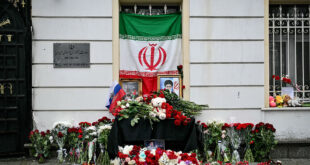Iran’s President Mahmoud Ahmadinejad and Saudi King Abdullah agreed to counter attempts to fuel Sunni-Shiite strife during a visit by the Iranian leader to Saudi Arabia. Ahmadinejad said he concurred with Abdullah during talks on Saturday that Iran and the kingdom would work together to thwart “enemy” plots seeking to divide the Islamic world.
According to the Saudi SPA news agency, Ahmadinejad also endorsed Riyadh’s efforts to resolve the political crisis in Lebanon.
It said the two leaders stressed the need to preserve Iraq’s national unity and ensure equality between its citizens.
The agreement to prevent sectarian strife was reported after Ahmadinejad ended a brief visit to Riyadh overshadowed by the ongoing Sunni-Shiite violence in Iraq and a political deadlock in Lebanon which has raised fears of similar infighting.
“The two leaders affirmed that the greatest danger presently threatening the Islamic nation is the attempt to fuel the fire of strife between Sunni and Shiite Muslims, and that efforts must concentrate on countering these attempts and closing ranks,” SPA said.
Ahmadinejad told reporters after returning to Tehran that he discussed with Abdullah “the plots carried out by the enemies in order to divide the world of Islam.”
“Fortunately we and the Saudis were fully aware of the threats of our enemies and we condemned them,” he said.
He did not specify who the enemies were. Iran’s chief Western foe, the United States, is one of Riyadh’s closest allies.
Lebanon has also severely tested ties between predominantly Shiite Iran and Sunni-dominated Saudi Arabia, which provides substantial financial aid to Beirut and has close links with the Western-backed government of Sunni Prime Minister Fuad Siniora.
The anti-Syrian Lebanese administration has been crippled by an opposition ministerial walkout and an open-ended protest spearheaded by the Shiite movement Hezbollah.
But Riyadh and Tehran recently began working together to reduce tensions in Lebanon, and according to the Saudi account of the talks, Ahmadinejad stated that Iran “assists the kingdom’s efforts to calm the situation in Lebanon and end its political crisis.”
He and Abdullah expressed the hope that “all Lebanese sides will respond (positively) to these efforts,” SPA said.
The two leaders affirmed that they were keen on preserving “Iraq’s independence, national unity and equality between its citizens,” it said.
“We discussed the Palestinian and Iraq issues comprehensively. We have common views in this regard,” Ahmadinejad told reporters at Tehran’s main airport.
Ahmadinejad’s visit came at a time when his country is under intense Western pressure over its nuclear program. Saudi Arabia champions a nuclear-free Middle East, but is also keen to avert a US-Iran military showdown which could destabilize the entire Gulf region.
The Iranian leader had previously met King Abdullah at an Islamic summit in Mecca in December 2005, making this his first visit to the kingdom specifically for bilateral talks.
“My trip was a business trip and was necessary to talk about the developments in our region and the world of Islam and be briefed about each other’s point of view,” he said.
Saudi commentators saw Ahmadinejad’s visit as a sign that the two countries are pooling efforts to ease explosive regional crises.
 Eurasia Press & News
Eurasia Press & News



